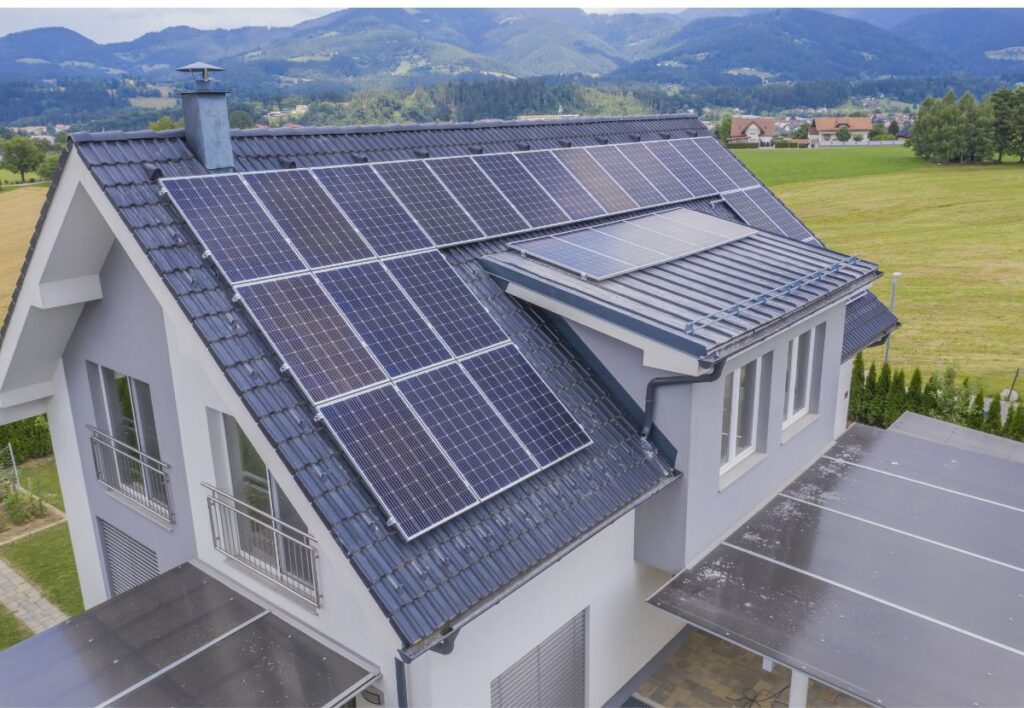Solar heating systems use solar energy instead of fossil fuels or electricity to heat water or air for residential use. It taps into a renewable and free energy source—sunlight.
The heavy winter increases the heating demand. Using regular electricity or gas will increase the cost to a great extent.
That’s why solar heating is getting popular day by day. It reduces dependency on non-renewable energy and reduces environmental impact, leading to a cleaner, more sustainable energy future. Learn how does the solar heating system works.

Components of a Solar Heating System
- Solar Collector: It captures sunlight and heats the water with black-coated tubes or panels covered with glass.
- Storage Tank: It holds the hot water. The insulation keeps the water warm for longer.
- Inlet and Outlet Pipes: Inlet pipes bring in cold water, and the outlet pipes send hot water to taps or showers.
- Mounting Stand: It holds the collector at the right angle to collect heat from the sun.
- Water Supply: It feeds cold water into the system through gravity or pressure..
- Heat Transfer Fluid: A special fluid (like glycol) is heated instead of water for colder areas and transfers heat through a heat exchanger.
- Backup Heater: Works when sunlight isn’t enough..
How does solar heating systems manipulate sun energy
Sunlight Collection
The system has a solar collector that absorbs and traps solar radiation. It is usually a weatherproof box painted black and covered with glass. There are tubes inside the collector to carry water.
Water Flow
The lower part of the storage tank gets filled with cold water from an overhead or municipal tank. It flows through the tubes in the collector to get heated by the sun.
Heat Transfer Mechanism:
The vacuum tubes inside the sun bank system insulate and heat the water without using pumps. It relies on natural water pressure instead of an electric pump.
Hot Water Storage & Delivery
The water becomes lighter as it heats up. Then it rises back into the upper part of the storage tank. On the other hand, cold water replaces the hot water in the tubes to create constant circulation during sunny hours. The hot water goes to the shower or sink through household plumbing.
System Pressure & Backup
Well water or municipal pressure is used in systems like Sun Bank to push water through the system. Sometimes, electric heating elements are used as a backup heater during cloudy days.
Types of Solar Heating Systems
Active vs. Passive Systems
Active solar heating systems use mechanical elements to circulate fluids or air through collectors. It uses pumps, valves, and controllers for an efficient and more controlled system.
Passive solar heating systems rely mainly on the natural movement of heat through convection and gravity. No electricity or maintenance is required.
| Feature | Active Solar Heating | Passive Solar Heating |
| Mechanism | Uses pumps, fans, and controls to move heat | Uses convection or gravity |
| Efficiency | High | Low |
| Installation Cost | Higher for equipment | Lower and simpler setup |
| Maintenance | Regular | Minimal |
| Climate Suitability | Ideal for Wisconsin’s cold climates | Suitable for mild or moderate climates |
| Energy Source | A small amount of external energy (electricity) | No external |
| Control | Easily controllable and adjustable | Limited control |
| Integration | Works with existing HVAC or radiant systems | Needs customized building design |
Air-Based vs. Liquid-Based Solar Heating Systems
| Feature | Air-Based | Liquid-Based |
| Heat Transfer Medium | Air | Water |
| Performance in Cold Climates | Works in cold but is less effective for whole-home heating | Ideal for cold climates like Wisconsin |
| Installation Complexity | Simpler | More complex |
| Freeze Risk | No risk of freezing | Requires freeze protection |
| System Cost | Lower | Higher |
| Efficiency | Less efficient | More efficient |
Which one is Best for Wisconsin Homes
Active liquid-based solar heating systems are better for Wisconsin’s weather. However, use one with freeze-resistant technology to operate in low temperatures. You can even integrate it with your existing heating systems. It will provide warmth throughout the year without causing too many energy bills.
Why should you use a solar heating system in Wisconsin
Reduces Heating Costs
Winters are long in Wisconsin, leading to higher energy bills. Using a solar heating system will reduce the costs by utilizing free solar energy.
Works Even in Cold Climates
Solar energy is unavailable during off seasons, especially during snowfall and frigid conditions. However, advanced solar heating systems can work efficiently even in sub-zero temperatures.
Increases Home Value
Using a solar heating system improves your property value. Energy-efficient houses are more in demand nowadays.
Reduces Environmental Impact
Sustainability is a major concern nowadays, and people of Wisconsin value sustainability. A solar heating system can easily reduce the carbon footprint. It is a bigger step toward greener energy use.
Tax Incentives & Rebates
Using a solar heating system can provide you with an advantage on federal tax credits. You can also get local incentives.
Energy Independence
With a solar heating system, you rely more on yourself and less on external utility companies. It gives you more control over your heating costs.
Low Maintenance and Long Lifespan
You don’t need to repair or replace the systems yearly. They can last 20+ years, offering long-term value with little maintenance.
Is the monthly bill for solar panels higher?
No, the monthly bill for solar panels is not higher. You can even reduce the cost of your grid electric bill to zero with a proper solar panel setup. However, there is an upfront cost of installing the solar panel. So, consider that before making any decision.
Is solar energy a good or bad thing to buy?
Solar energy is the best thing you can buy for yourself and for the world. It will reduce the grid energy cost while reducing the pressure on fossil fuel energy. You can build a better world with this carbon-free, clean energy and leave a better world for your future generations.
Need a Solar Installation system for your home?
Contact Lehman Electrical for energy-saving solar installation for your home.
